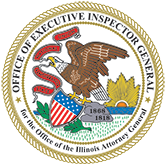
Individuals are encouraged to contact the Office of the Executive Inspector General (“OEIG”) with information regarding waste, fraud, corruption, and abuse relating to employees of the Office of the Illinois Attorney General. Although a complaint may be made anonymously under the law, it is the practice of the OEIG to keep the names of complainants confidential, unless otherwise required by law. Further, under the law the name of the individual providing information can only be disclosed with that person's consent or if disclosure of the identity of the person is required by law.
Complaints received by the OEIG are reviewed to determine if the allegations constitute a violation of the law by an individual under the jurisdiction of the Attorney General. If so, the allegation is investigated by a member of the OEIG. Once the investigation is concluded, and if a violation is found, a report of the investigation is completed and provided to the Attorney General. In that report, the Executive Inspector General may include recommendations for personnel actions or recommendations for addressing any violations uncovered during the investigation. The Executive Inspector General may also file a complaint before the Executive Ethics Commission. In addition, the Executive Inspector General may refer cases for criminal prosecution.
The OEIG serves a valuable role in ensuring that the Office of the Attorney General operates efficiently and without fraud or abuse, thus ensuring that the public maintains the highest degree of trust and confidence in the Office of the Attorney General.
Both employees of the Office of the Attorney General and outside individuals are welcome to contact the Office of the Executive Inspector General with complaints about fraud, corruption, or abuse relating to employees of the Office of the Attorney General, and vendors or others doing business with the Attorney General.
Helpline at (888) 814-4646
E-mail the Office of the Executive Inspector General at ethics.OEIG@ilag.gov.
The State Officials and Employees Ethics Act (5 ILCS 430/15-5 et. seq.) provides protection to those who report fraud, corruption, and waste.
If you are a state employee and you (1) disclose or threaten to disclose to your supervisor or any public body an act, policy, or practice that you reasonably believe to be a violation of law, rule, or regulation by another state employee, (2) provide information to or testify before any public body conducting an investigation, hearing, or inquiry into a violation of law, rule, or regulation, or (3) assist or participate in a proceeding to enforce the State Officials and Employees Ethics Act, then a state agency cannot take retaliatory action such as reprimand, discharge, suspension, demotion, or denial of promotion or transfer that occurs in retaliation for an employee's exercise of any one of these three protected activities.
If retaliation occurs, remedies may include:
- Reinstatement;
- Two times back pay;
- Interest on back pay; and/or
- Payment of reasonable costs and attorneys' fees.
